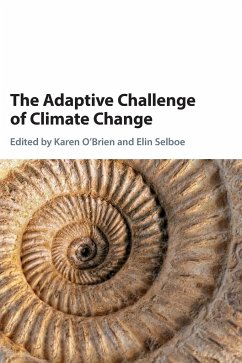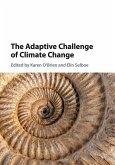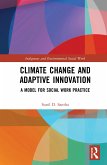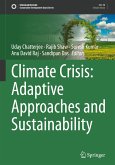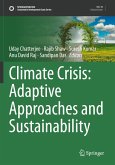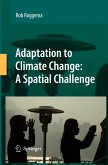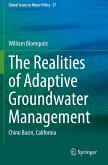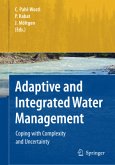The Adaptive Challenge of Climate Change
Herausgeber: O'Brien, Karen; Selboe, Elin
The Adaptive Challenge of Climate Change
Herausgeber: O'Brien, Karen; Selboe, Elin
- Gebundenes Buch
- Merkliste
- Auf die Merkliste
- Bewerten Bewerten
- Teilen
- Produkt teilen
- Produkterinnerung
- Produkterinnerung
This book presents a new perspective on climate change for researchers and policymakers in the environmental social sciences and humanities.
Andere Kunden interessierten sich auch für
![The Adaptive Challenge of Climate Change The Adaptive Challenge of Climate Change]() The Adaptive Challenge of Climate Change46,99 €
The Adaptive Challenge of Climate Change46,99 €![Climate Change and Adaptive Innovation Climate Change and Adaptive Innovation]() Sunil D. SanthaClimate Change and Adaptive Innovation220,99 €
Sunil D. SanthaClimate Change and Adaptive Innovation220,99 €![Climate Crisis: Adaptive Approaches and Sustainability Climate Crisis: Adaptive Approaches and Sustainability]() Climate Crisis: Adaptive Approaches and Sustainability108,99 €
Climate Crisis: Adaptive Approaches and Sustainability108,99 €![Climate Crisis: Adaptive Approaches and Sustainability Climate Crisis: Adaptive Approaches and Sustainability]() Climate Crisis: Adaptive Approaches and Sustainability109,99 €
Climate Crisis: Adaptive Approaches and Sustainability109,99 €![Adaptation to Climate Change: A Spatial Challenge Adaptation to Climate Change: A Spatial Challenge]() Rob RoggemaAdaptation to Climate Change: A Spatial Challenge81,99 €
Rob RoggemaAdaptation to Climate Change: A Spatial Challenge81,99 €![The Realities of Adaptive Groundwater Management The Realities of Adaptive Groundwater Management]() William BlomquistThe Realities of Adaptive Groundwater Management106,99 €
William BlomquistThe Realities of Adaptive Groundwater Management106,99 €![Adaptive and Integrated Water Management Adaptive and Integrated Water Management]() Adaptive and Integrated Water Management116,99 €
Adaptive and Integrated Water Management116,99 €-
-
-
This book presents a new perspective on climate change for researchers and policymakers in the environmental social sciences and humanities.
Hinweis: Dieser Artikel kann nur an eine deutsche Lieferadresse ausgeliefert werden.
Hinweis: Dieser Artikel kann nur an eine deutsche Lieferadresse ausgeliefert werden.
Produktdetails
- Produktdetails
- Verlag: Cambridge University Press
- Seitenzahl: 346
- Erscheinungstermin: 8. Juli 2015
- Englisch
- Abmessung: 260mm x 183mm x 23mm
- Gewicht: 846g
- ISBN-13: 9781107022980
- ISBN-10: 1107022983
- Artikelnr.: 42768229
- Herstellerkennzeichnung
- Libri GmbH
- Europaallee 1
- 36244 Bad Hersfeld
- gpsr@libri.de
- Verlag: Cambridge University Press
- Seitenzahl: 346
- Erscheinungstermin: 8. Juli 2015
- Englisch
- Abmessung: 260mm x 183mm x 23mm
- Gewicht: 846g
- ISBN-13: 9781107022980
- ISBN-10: 1107022983
- Artikelnr.: 42768229
- Herstellerkennzeichnung
- Libri GmbH
- Europaallee 1
- 36244 Bad Hersfeld
- gpsr@libri.de
1. Climate change as an adaptive challenge Karen O'Brien and Elin Selboe;
2. The intangibles of climate change adaptation: philosophy, ethics and
values Bertrand Guillaume and Stijn Neuteleers; 3. Urban climate change
policy transitions: views from New York City and London William Solecki,
Lesley Patrick and Zoe Sprigings; 4. Planning for climate change adaptation
in urban areas Jan Erling Klausen, Inger-Lise Saglie, Knut Bjørn Stokke and
Marte Winswold; 5. The challenge of governing adaptation in Australia
Steven Waller and Jon Barnett; 6. Emerging equity and justice concerns for
climate change adaptation: a case study of New York State Peter Vancura and
Robin Leichenko; 7. Transforming towards or away from sustainability? How
conflicting interests and aspirations influence local adaptation Siri
Eriksen and Elin Selboe; 8. Opportunistic adaptation: new discourses on
oil, equity and environmental security Berit Kristoffersen; 9. Place
attachment, identity and adaptation Tare Quinn, Irene Lorenzoni and W. Neil
Adger; 10. Values and traditional practices in adaptation to climate change
- evidence from a Q method study in two communities in Labrador, Canada
Johanna Wolf, Ilana Allice and Trevor Bell; 11. Exploring vulnerability and
adaptation narratives among fishers, farmers and municipal planners in
Northern Norway Grete K. Hovelsrud, Jennifer J. West and Halvor Dannevig;
12. Changes in organizational culture, changes in adaptive capacity?
Examples from the Norwegian and Swedish electricity sectors Tor Håkon
Inderberg; 13. From informant to actor to leader: social-ecological
inventories as a catalyst for leadership development in participatory
community climate change adaptation Bradley May; 14. Participation and
learning for climate change adaptation: a case study of the Swedish
forestry sector Åsa Gerger Swartling, Oskar Wallgren, Richard J. T. Klein,
Johanna Ulmanen and Maja Dahlin; 15. Integral GIS: widening the frame of
reference for adaptation planning Lynn D. Rosentrater; 16. There must be
more: communication to close the cultural divide Susanne C. Moser and Carol
L. Berzonsky; 17. Social transformation: the real adaptive challenge Karen
O'Brien and Elin Selboe.
2. The intangibles of climate change adaptation: philosophy, ethics and
values Bertrand Guillaume and Stijn Neuteleers; 3. Urban climate change
policy transitions: views from New York City and London William Solecki,
Lesley Patrick and Zoe Sprigings; 4. Planning for climate change adaptation
in urban areas Jan Erling Klausen, Inger-Lise Saglie, Knut Bjørn Stokke and
Marte Winswold; 5. The challenge of governing adaptation in Australia
Steven Waller and Jon Barnett; 6. Emerging equity and justice concerns for
climate change adaptation: a case study of New York State Peter Vancura and
Robin Leichenko; 7. Transforming towards or away from sustainability? How
conflicting interests and aspirations influence local adaptation Siri
Eriksen and Elin Selboe; 8. Opportunistic adaptation: new discourses on
oil, equity and environmental security Berit Kristoffersen; 9. Place
attachment, identity and adaptation Tare Quinn, Irene Lorenzoni and W. Neil
Adger; 10. Values and traditional practices in adaptation to climate change
- evidence from a Q method study in two communities in Labrador, Canada
Johanna Wolf, Ilana Allice and Trevor Bell; 11. Exploring vulnerability and
adaptation narratives among fishers, farmers and municipal planners in
Northern Norway Grete K. Hovelsrud, Jennifer J. West and Halvor Dannevig;
12. Changes in organizational culture, changes in adaptive capacity?
Examples from the Norwegian and Swedish electricity sectors Tor Håkon
Inderberg; 13. From informant to actor to leader: social-ecological
inventories as a catalyst for leadership development in participatory
community climate change adaptation Bradley May; 14. Participation and
learning for climate change adaptation: a case study of the Swedish
forestry sector Åsa Gerger Swartling, Oskar Wallgren, Richard J. T. Klein,
Johanna Ulmanen and Maja Dahlin; 15. Integral GIS: widening the frame of
reference for adaptation planning Lynn D. Rosentrater; 16. There must be
more: communication to close the cultural divide Susanne C. Moser and Carol
L. Berzonsky; 17. Social transformation: the real adaptive challenge Karen
O'Brien and Elin Selboe.
1. Climate change as an adaptive challenge Karen O'Brien and Elin Selboe;
2. The intangibles of climate change adaptation: philosophy, ethics and
values Bertrand Guillaume and Stijn Neuteleers; 3. Urban climate change
policy transitions: views from New York City and London William Solecki,
Lesley Patrick and Zoe Sprigings; 4. Planning for climate change adaptation
in urban areas Jan Erling Klausen, Inger-Lise Saglie, Knut Bjørn Stokke and
Marte Winswold; 5. The challenge of governing adaptation in Australia
Steven Waller and Jon Barnett; 6. Emerging equity and justice concerns for
climate change adaptation: a case study of New York State Peter Vancura and
Robin Leichenko; 7. Transforming towards or away from sustainability? How
conflicting interests and aspirations influence local adaptation Siri
Eriksen and Elin Selboe; 8. Opportunistic adaptation: new discourses on
oil, equity and environmental security Berit Kristoffersen; 9. Place
attachment, identity and adaptation Tare Quinn, Irene Lorenzoni and W. Neil
Adger; 10. Values and traditional practices in adaptation to climate change
- evidence from a Q method study in two communities in Labrador, Canada
Johanna Wolf, Ilana Allice and Trevor Bell; 11. Exploring vulnerability and
adaptation narratives among fishers, farmers and municipal planners in
Northern Norway Grete K. Hovelsrud, Jennifer J. West and Halvor Dannevig;
12. Changes in organizational culture, changes in adaptive capacity?
Examples from the Norwegian and Swedish electricity sectors Tor Håkon
Inderberg; 13. From informant to actor to leader: social-ecological
inventories as a catalyst for leadership development in participatory
community climate change adaptation Bradley May; 14. Participation and
learning for climate change adaptation: a case study of the Swedish
forestry sector Åsa Gerger Swartling, Oskar Wallgren, Richard J. T. Klein,
Johanna Ulmanen and Maja Dahlin; 15. Integral GIS: widening the frame of
reference for adaptation planning Lynn D. Rosentrater; 16. There must be
more: communication to close the cultural divide Susanne C. Moser and Carol
L. Berzonsky; 17. Social transformation: the real adaptive challenge Karen
O'Brien and Elin Selboe.
2. The intangibles of climate change adaptation: philosophy, ethics and
values Bertrand Guillaume and Stijn Neuteleers; 3. Urban climate change
policy transitions: views from New York City and London William Solecki,
Lesley Patrick and Zoe Sprigings; 4. Planning for climate change adaptation
in urban areas Jan Erling Klausen, Inger-Lise Saglie, Knut Bjørn Stokke and
Marte Winswold; 5. The challenge of governing adaptation in Australia
Steven Waller and Jon Barnett; 6. Emerging equity and justice concerns for
climate change adaptation: a case study of New York State Peter Vancura and
Robin Leichenko; 7. Transforming towards or away from sustainability? How
conflicting interests and aspirations influence local adaptation Siri
Eriksen and Elin Selboe; 8. Opportunistic adaptation: new discourses on
oil, equity and environmental security Berit Kristoffersen; 9. Place
attachment, identity and adaptation Tare Quinn, Irene Lorenzoni and W. Neil
Adger; 10. Values and traditional practices in adaptation to climate change
- evidence from a Q method study in two communities in Labrador, Canada
Johanna Wolf, Ilana Allice and Trevor Bell; 11. Exploring vulnerability and
adaptation narratives among fishers, farmers and municipal planners in
Northern Norway Grete K. Hovelsrud, Jennifer J. West and Halvor Dannevig;
12. Changes in organizational culture, changes in adaptive capacity?
Examples from the Norwegian and Swedish electricity sectors Tor Håkon
Inderberg; 13. From informant to actor to leader: social-ecological
inventories as a catalyst for leadership development in participatory
community climate change adaptation Bradley May; 14. Participation and
learning for climate change adaptation: a case study of the Swedish
forestry sector Åsa Gerger Swartling, Oskar Wallgren, Richard J. T. Klein,
Johanna Ulmanen and Maja Dahlin; 15. Integral GIS: widening the frame of
reference for adaptation planning Lynn D. Rosentrater; 16. There must be
more: communication to close the cultural divide Susanne C. Moser and Carol
L. Berzonsky; 17. Social transformation: the real adaptive challenge Karen
O'Brien and Elin Selboe.

